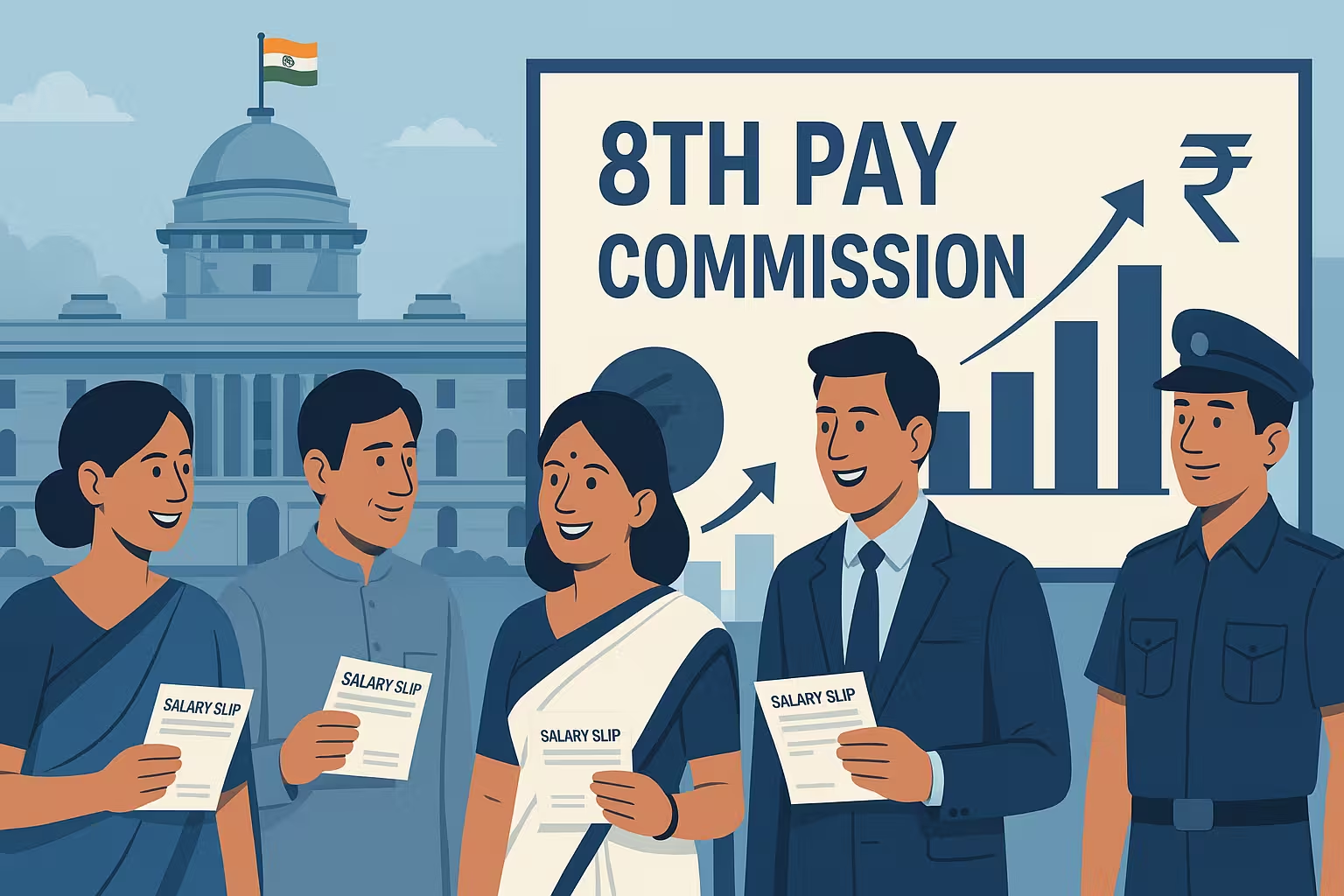Physical Address
304 North Cardinal St.
Dorchester Center, MA 02124
Physical Address
304 North Cardinal St.
Dorchester Center, MA 02124

In a recent development that could significantly impact over one crore central government employees and pensioners, reports suggest that the 8th Pay Commission might recommend a salary hike of 30% to 34%. If implemented, this could lead to a substantial increase in pay and pensions, bringing relief to many amid rising inflation and cost of living.

According to a report by Ambit Capital, a leading financial services firm, the government may consider rolling out the 8th Pay Commission in FY27 (Financial Year 2026-27). The report indicates a potential fitment factor revision from the current 2.57 (used in the 7th Pay Commission) to a range between 1.83 and 2.5. This shift could result in a net salary and pension hike of 30% to 34%.
The Ambit Capital report further states: “We expect the 8th Pay Commission to be implemented in FY27, leading to an increase in salaries and pensions. This could positively impact consumption trends in the economy.”
The report also mentions that this move might lead to an additional fiscal burden of ₹1.3 to ₹1.8 lakh crore annually, which is nearly 0.4% of India’s GDP. This estimation has raised concerns among policy planners and economists regarding the feasibility of immediate implementation.
Traditionally, Pay Commissions are set up once every ten years. The 7th Pay Commission was implemented in January 2016, and based on that cycle, the 8th Pay Commission was expected around January 2026. However, the Ambit Capital report and other expert opinions suggest that implementation might be delayed by a few quarters, potentially pushing it to late 2026 or early 2027.
The delay, according to the report, may be due to fiscal constraints and upcoming Lok Sabha elections in 2029, which may influence budgetary decisions and the rollout timeline.
Additionally, the absence of any formal announcement or Terms of Reference (ToR) for the commission has fueled speculation that the government might prefer an incremental revision approach rather than setting up a full-fledged Pay Commission.
The fitment factor is a multiplier used to revise the basic salary of central government employees. In the 7th Pay Commission, a fitment factor of 2.57 was applied. Under the proposed 8th Pay Commission, if the factor increases to 2.5 or beyond, the base salaries could see a sharp jump. For example, an employee earning a basic salary of Rs. 30,000 could expect a revised salary of over Rs. 39,000 if the factor is raised to 2.5.
The fitment factor not only affects basic pay but also influences other allowances such as Dearness Allowance (DA), House Rent Allowance (HRA), and Travel Allowance (TA), making it a critical component in the overall salary structure.
These beneficiaries include personnel from the armed forces, central ministries, and various government departments. State government employees may also receive revised pay structures based on central recommendations, subject to state-level approval.
Economists believe that the implementation of the 8th Pay Commission could lead to a positive consumption boost. According to the Ambit Capital report, this hike may result in higher household spending, especially in rural and semi-urban areas. However, there are concerns about increased fiscal pressure on the central budget, which might delay the official announcement.
Some experts also warn that while the increased expenditure may boost demand in the short term, it could result in a widened fiscal deficit if not balanced with adequate revenue measures or cuts in other expenditures.
As of now, the Government of India has not officially confirmed the formation of the 8th Pay Commission. Employees’ unions have been pressing for early setup and implementation, especially amid rising inflation. More clarity is expected in upcoming Union Budgets and official government circulars.
Meanwhile, multiple employee federations have submitted memorandums to the Finance Ministry requesting that the Pay Commission be constituted in 2025 itself, ensuring timely deliberations and structured implementation by January 2026.
The 8th Pay Commission, if implemented with the projected revisions, will mark a major financial uplift for government employees and pensioners across India. While the timeline remains uncertain, the recent reports bring hope for a significant salary boost.
The coming months will be crucial as stakeholders await a formal announcement from the government. Until then, the debate on feasibility, fiscal impact, and political timing continues to shape the narrative around the 8th Pay Commission.